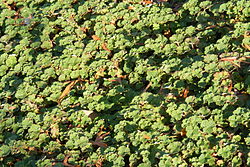Biology:Rubus hayata-koidzumii
| Rubus hayata-koidzumii | |
|---|---|

| |
| Rubus calycinoides | |
| Scientific classification | |
| Kingdom: | Plantae
|
| (unranked): | |
| (unranked): | |
| (unranked): | |
| Order: | |
| Family: | |
| Genus: | |
| Subgenus: | |
| Species: | R. hayata-koidzumii
|
| Binomial name | |
| Rubus hayata-koidzumii Naruh.
| |
| Synonyms | |
|
R. calycinoides Hayata ex Koidz. non Kuntze[1] | |
Rubus hayata-koidzumii is probably better known by the (illegitimate) synonym Rubus calycinoides or as creeping raspberry. It is a low-growing member of the genus Rubus which also includes better known edibles such as the blackberry, raspberry, boysenberry, and thimbleberry.
History
Originally from Taiwan where it grows at high elevations.[2] Its Chinese name is 玉山悬钩子 (simplified) or 玉山懸鉤子 (traditional).
Uses
Plants are sometimes used to form a low growing, non-invasive, semi-evergreen to evergreen ground cover.[3][2]
Fruit/flower
Like other plants in this genus, creeping raspberries bear aggregate fruits. What this means is that each "fruit" is actually a cluster of small fruit-like parts (pistils) connected together into one mass. Creeping raspberry fruits are similar in appearance to blackberries or red raspberries, but differ in that their color is yellow to orangish-red. The edible fruits follow white flowers which are borne in early summer.[3]
Pests/diseases
There are no known pests or diseases which affect the creeping raspberry.[2][3]
This plant can be susceptible to overwatering, however, which can cause root rot in wet or heavy soil and good drainage is important.[citation needed]
Other names
The names Rubus pentalobus[4] and Rubus rolfei[5] are sometimes used in place of R. hayata-koidzumii or R. calycinoides. There are a number of other common names including "Crinkle-leaf Creeper",[4] "Taiwanese Creeping Rubus", and "Creeping Bramble",[2] but the plant is also often simply referred to by cultivar names such as 'Emerald Carpet'.[2]
References
- ↑ {{citation | mode = cs1 | title = Rubus hayata-koidzumii | work = Germplasm Resources Information Network (GRIN) | url = | publisher = [[Organization:Agricultural Research ServAgricultural Research Service (ARS), United States Department of Agriculture (USDA) | access-date = 19 January 2018 }}
- ↑ 2.0 2.1 2.2 2.3 2.4 Perennial Ground Covers by David S. MacKenzie: Rubus calycinoides
- ↑ 3.0 3.1 3.2 Washington State University: Rubus calycinoides
- ↑ 4.0 4.1 Oregon State University Department of Horticulture: Rubus calycinoides
- ↑ Western Kentucky University: Rubus calycinoides
External links
Wikidata ☰ Q17271964 entry
